 |
Picks is a monthly sampling of Japan's art scene, offering commentary by a variety of reviewers about exhibitions at museums and galleries in recent weeks, with an emphasis on contemporary art by young artists. |
 |
 |
|
|
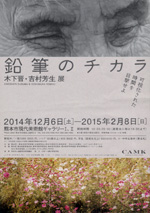 |
|
| The Power of a Pencil: Susumu Kinoshita and Yoshio Yoshimura |
| 6 December 2014 - 8 February 2015 |
Contemporary Art Museum Kumamoto
(Kumamoto) |
 |
| Veteran artists Kinoshita (b. 1947) and Yoshimura (1950-2013) shared a love of the pencil, albeit in the service of disparate approaches and subject matter. In Kinoshita's depictions of Tetsuo Sakurai, a poet and Hansen's Disease sufferer, and Haru Kobayashi, the last of Japan's goze -- blind itinerant female musicians -- one feels he is searching the faces of total strangers to find himself. Yoshimura, meanwhile, obsessively covered newspaper pages with self-portraits that aim their penetrating gaze directly at the viewer. |
|
|
 |
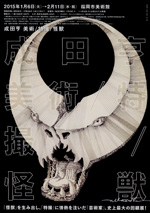 |
|
| Tohl Narita: Art / Special Effects / Monsters |
| 6 January - 11 February 2015 |
Fukuoka Art Museum
(Fukuoka) |
 |
| This thoroughgoing retrospective demonstrated that Narita (1929-2002), best known for designing the monsters that populated the hit Ultraman TV series, was also an accomplished artist. Featured were over 700 works, including paintings and sculptures as well as his monsters, which truly roar with life. It is clear that Narita's talents were responsible in large part for the Ultraman franchise's pride of place in the pop-culture pantheon. |
|
|

|
 |
 |
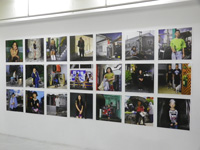 |
 |
| Ryuichi Ishikawa: Okinawan Portraits |
| 27 January - 21 February 2015 |
The Third Gallery Aya
(Osaka) |
 |
| Ishikawa presented nearly 80 portraits selected from some 3,000 photos he took of people he met while biking around the islands of Okinawa. What is striking is the distinct individuality of each subject. Images of kids in punk fashion and right-wing extremists caught this viewer by surprise, forcing him to confront his own stereotypes about Okinawa. |
|
|
 |
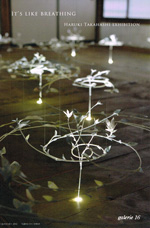 |
 |
| Haruki Takahashi: Like Breathing |
|
15 - 30 January 2015 |
galerie 16
(Kyoto) |
 |
| Takahashi's vine-like structures filled the gallery space at a height between knee and hip level, bearing paintings in lieu of flowers. Only after some scrutiny did it become apparent that these were porcelain sculptures. The artist, who resides in Kanazawa, describes his work as part of the region's celebrated Kutani-ware tradition, but his technique is in a class by itself. |
|
|
|
|
|
|
|

|
 |
 |
|
 |
 |
| Kengo Nakamura: Modern Japanese-style Painting 1994-2014 |
| 4 January - 15 February 2015 |
Kakegawa Ninomaru Museum of Art
(Shizuoka) |
 |
| Nakamura's motifs range from montages of speech balloon and character outlines cut out from Osamu Tezuka's manga to abstractions composed of ASCII graphic characters -- yet his materials are those of traditional Nihonga. It was especially gratifying to see all 40 works from his Composition Tokyo series, in which he converted apartment floor plans into Mondrianesque paintings, gathered in one place. |
|

|
 |
 |
 |
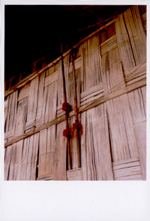 |
|
| Nao Tsuda: NAGA |
| 2 - 22 February 2015 |
POST
(Tokyo) |
 |
| Photographer Tsuda's latest series portrays the lives and rituals of the Naga people of northern Myanmar. The accompanying text sometimes reads like an anthropologist's field notes, in which Tsuda traces, chronologically and in some detail, the process by which he gained access to an alien spiritual world with the help of some excellent guides. |
|
|
 |
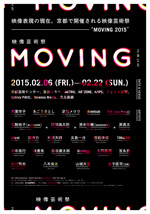 |
 |
MOVING 2015 |
6 - 22 February 2015 |
Kyoto Art Center, other venues
(Kyoto) |
 |
| Held at nine locations around Kyoto, this video-arts festival offered works by Ryota Yagi, Hiroki Kehara, Miiku Sakanishi, Katsunori Mizuno, and Chikara Urasaki. All of the presentations were worth viewing, but the overall event would have benefited from more coordinated promotion by the curators. |
|
|
|
|
|
|
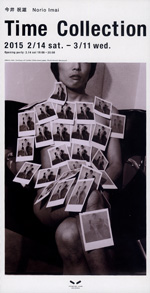 |
 |
| Norio Imai: Time Collection |
| 14 January - 11 March 2015 |
Yumiko Chiba Associates
(Tokyo) |
 |
| Imai is one of a number of artists associated with the sixties and seventies (others include Jiro Takamatsu and Kanji Wakae) that this gallery has made the focus of solo shows of late. Imai joined the Gutai Art Association in 1964, at the tender age of 17, and went on to produce noted works of conceptual and video art in the seventies and eighties. In all his work one senses an unyielding drive to infuse art with youthful energy and new media. |
|
 |
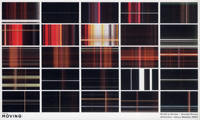 |
 |
| Kotaro Maetani: World in Motion |
| 6 - 22 February 2015 |
Gallery PARC
(Kyoto) |
 |
| In these video works, undulating bands of light criss-crossed multiple monitors. The compositions on display augmented Maetani's sublime minimalism with what felt like a slightly more human dimension imparted through sensations of speed and irregular motion. |
|
|
|
|
 |
|